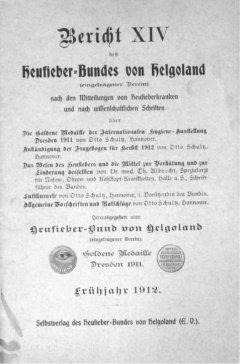This project explores the emergence of allergy as a medical diagnosis, and the transformations of knowledge associated with that process, as a case study of the border between experts and the people they are concerned with. From their emergence in the nineteenth century, hay fever and similar conditions were thought of as a type of modern neurosis typically affecting the urban bourgeoisie. People seeking relief from their suffering at the fashionable resort of Heligoland founded the Heufieberbund (“Hay Fever Federation”) in 1897. The organization immediately unfolded an ambitious program of gathering data, propagating and performing research into the condition, and promoting acceptance of the diagnosis through its widely circulated annual reports. From the 1920s, parallel to the establishment of allergology as a biomedical specialty, this was to change: a division between physician and patient, personal experience and scientific fact, gradually became noticeable.
The scope of my project includes the transformation of the roles that patients and physicians as ‘known’ versus ‘knowing’ subjects in the practices concerning hay fever/allergy. At the outset, the typical practices generating and implementing medical knowledge—observing and recording symptoms, gathering and analyzing data, taking preventive measures, testing and undergoing treatment, educating physicians, advising patients, and so on—were not associated with two distinct selves (the patient and the physician). The process of dividing those practices was simultaneously a division of a specific kind of subjectivity by sorting the previously ambiguous cluster of patient-experts into opposite but complementary positions, and thus drawing a line between the knowers and the known.

